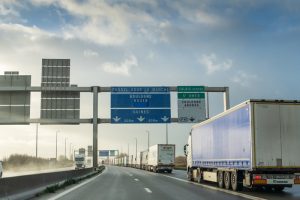 After years of negotiation and uncertainty, we are officially in the post-Brexit era. To preserve their mutually beneficial trading relationship, the European Union (EU) and United Kingdom (UK) reached a deal that went into place on January 1, 2021. While the agreement is beneficial for both parties, questions remain about its impact on the logistics and transportation industry. The new regulations at the border are already causing major blocks and delays.
After years of negotiation and uncertainty, we are officially in the post-Brexit era. To preserve their mutually beneficial trading relationship, the European Union (EU) and United Kingdom (UK) reached a deal that went into place on January 1, 2021. While the agreement is beneficial for both parties, questions remain about its impact on the logistics and transportation industry. The new regulations at the border are already causing major blocks and delays.
Here are some things that logistics and supply chain companies must take into account after the newest regulations:
- Traders must consider the rules of origin. These complex rules apply to goods that qualify for preferential trade terms under the agreement.
- All imports and exports are subject to customs formalities. Trading in both the UK and EU means complying with two different tax and legal systems.
- Companies are facing higher logistics costs. Trucking companies are reluctant to cross the border resulting in less capacity and higher surcharges.
- All imports into the EU must meet new standards and will be subject to regulatory checks and controls for safety, health, and other public policy purposes.
- Traders are obliged to change their delivery terms with their suppliers and customers from DDP to DAP to avoid complex customs procedures.
- Some traders face cash flow issues as import Value Added Tax (VAT) is payable when entering the European Union.
As a result of the new regulations, the Logistics Plus Europe team has noticed that many traders are not fully prepared for this transition. Increased potential for delays means that you need to have tight control over every aspect of your supply chain. Once you have full visibility of your supply chain, you can begin to plan and break down how the post-Brexit era changes things on an operational level.
At Logistics Plus, we understand the impact of these new regulations and how they affect customers and their transport flows. Our European team operates distribution centers in the UK and in the Netherlands that offer full customs brokerage services and regular trucking transfers between the two countries. We have a wide variety of services to help our customers optimize and facilitate European and UK VAT requirements. Additionally, Logistics Plus offers Importer of Record (IOR) and Exporter of Record (EOR) services that our customers can count on for a non-disrupted supply chain.
If you need assistance navigating the post-Brexit logistics era, please contact our team of logistics experts today.

